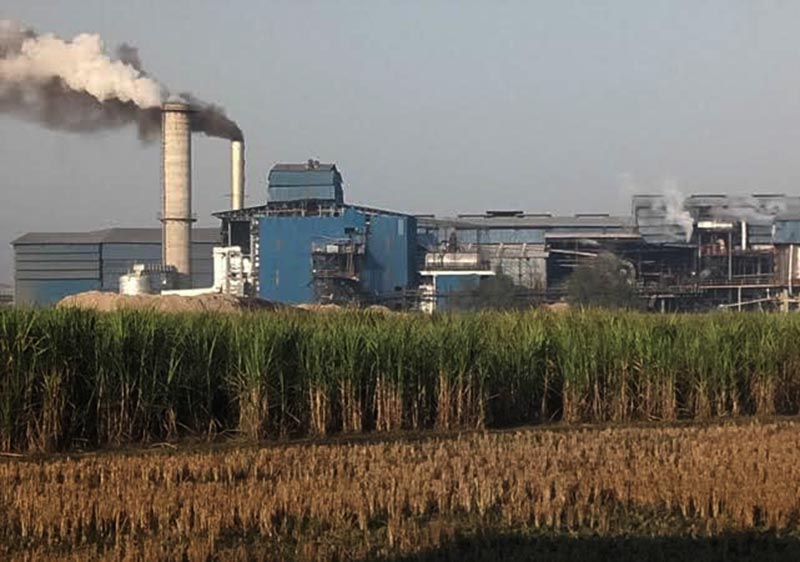Factories fail to compete with cheap imports
Kathmandu, January 23
Sugar factories in the country have been hit hard as they have failed to compete with cheaper imported sugar in the domestic market.
Though the government managed to forge consensus between sugarcane farmers and sugar mills to fix support price before plantation season to safeguard the cane growers, it has not been doing much to protect domestic industry that has been adversely affected along with global fall in price of sugar and low customs tariff.
The support price for sugarcane last year was fixed at Rs 531.20 per quintal. However, sugar mills have huge outstanding dues to farmers as their production has remained stuck at warehouses since a few months along with rampant fall in sugar price in the global market.
Ministry of Agricultural Development (MoAD) had proposed Ministry of Finance (MoF) to hike customs tariff on sugar to protect domestic factories a month back citing that the negative impact on sugar mills would ultimately hit cane growers. However, the MoF has not taken the proposal of the MoAD into due consideration yet.
The MoAD plans to make the country self-reliant in sugar production with introduction of safeguard policies for farmers, like support price of sugarcane. Since the last few years, the support price is being fixed through tripartite meeting among the government (MoAD and Ministry of Industry), cane growers and sugar mills.
Normally in a free market economy, import cannot be curbed by raising customs tariff. However, high-ranking officials of MoAD said that the ministry is mulling over this option as it aims to make the country self-sufficient in sugar production. Apart from fixing support price to safeguard farmers, MoAD is planning to extend subsidy on seeds, fertilisers, ensure low interest credit and insurance to encourage farmers.
“Even though it is a free market economy, India has adopted measures to raise tariff to 50 per cent through federal budget to protect their factories and cane growers,” a high-ranking official at the MoAD told The Himalayan Times, adding, “The price reduction in sugar could be just a short-term phenomenon, but our economy will suffer once the price of sugar starts to rise if we are unable to make timely intervention to sustain our production base.”
Sugar mills and farmers have long been at odds over the rate for sugarcane. “Cane growers are quite happy since the government started mediating between them and the sugar mills to fix support price, and subsequently production of sugarcane increased immensely,” as per MoAD officials. “It is leading us towards being self-sufficient in sugar production.”
While MoAD’s proposal to hike tariff has also invited criticism that the move would pamper sugar mills instead of encouraging them to be competent, Secretary at MoAD Suroj Pokharel pointed out that a number of countries have been providing subsidies on farming to minimise their production cost and export cheaper products worldwide. He further said there will be adverse impact on jobs and production of sugarcane in this duty regime.
Customs tariff of sugarcane is 15 per cent at present. The government had reduced the tariff of sugar to 15 per cent from 30 per cent some three years back when domestic production was very low. Back then, farmers were not too enthused about sugarcane farming as the mills did not offer them satisfactory price.
MoF officials refused to comment on the issue saying that they are studying the current situation.
Sugar mill owners have said that it is only a question of protecting domestic factories and farmers or not. “We have proposed the government to either hike the customs tariff or to incentivise the sugar mills,” said Rajesh Kediya, chairman of Indushankar Sugar mill. “Just like Dairy Development Corporation raises price of milk to support livestock farmers, beneficiary of the sugar mills are ultimately the cane growers.”
Kediya further said that while fixing the support price of sugarcane at Rs 531.20 per quintal at farm rate, the MoAD has proposed the price based on Rs 72 per kg market price of sugar. One quintal of sugarcane produces around nine kilos of sugar. In this regard, the production and transportation cost per kg of sugar would come to Rs 64, while import price of sugar including value added tax (VAT) is Rs 60 per kg. Sugar mills have said that they cannot sell sugar at around Rs 66.50 per kg, which is the prevailing market rate.
As per the data of the Department of Customs, around 60,000 tonnes of sugar has already been imported in five months of this fiscal. As per sugar manufacturers, total production of domestic factories is 175,000 tonnes, whereas the demand hovers between 210,000 and 220,000 tonnes per annum.
Sugar mill owners have urged the government to reduce the customs if the sugar mills start to cartel in price and increase the rate above Rs 72 per kg as agreed with the government during fixation of support price.
Quick look
Number of sugar mills in operation: 13
Capacity utilisation: 35% to 40%
Production: 175,000 tonnes per year
Demand: 220,000 tonnes per year
Sugarcane cultivation: 67,000 hectares
Cane production: 2.96 million tonnes per annum
Source: MoAD/Nepal Sugar Mills Association






